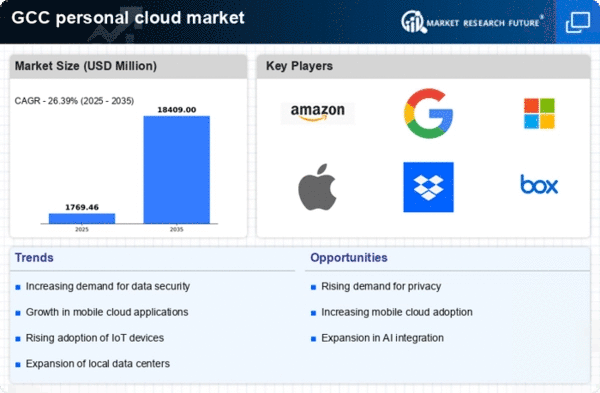Growing Adoption of Remote Work Solutions
The shift towards remote work has catalyzed the personal cloud market in the GCC. As organizations increasingly adopt flexible work arrangements, the demand for secure and accessible data storage solutions has surged. Employees require reliable access to files and applications from various locations, which personal cloud services can provide. According to recent data, the personal cloud market in the GCC is projected to grow at a CAGR of 15% over the next five years. This growth is driven by the need for collaboration tools and file-sharing capabilities that enhance productivity. Furthermore, businesses are investing in personal cloud solutions to ensure data security and compliance with local regulations, thereby reinforcing the importance of this market in the region.
Increased Focus on Data Privacy Regulations
The personal cloud market is experiencing a notable impact from the heightened emphasis on data privacy regulations within the GCC. Governments are implementing stricter laws to protect consumer data, which compels businesses to adopt personal cloud solutions that comply with these regulations. This trend is particularly relevant as organizations seek to avoid hefty fines and reputational damage associated with data breaches. The personal cloud market is expected to benefit from this regulatory landscape, as companies prioritize secure data storage options. Recent statistics indicate that compliance-related investments in the GCC are expected to reach $1 billion by 2026, further driving the demand for personal cloud services that align with these legal requirements.
Rising Consumer Awareness of Cloud Benefits
Consumer awareness regarding the advantages of personal cloud solutions is on the rise in the GCC. As individuals become more informed about the benefits of cloud storage, such as enhanced accessibility, scalability, and cost-effectiveness, the personal cloud market is likely to expand. This growing awareness is fueled by increased digital literacy and the proliferation of smart devices. Market data suggests that the number of personal cloud users in the GCC is expected to double by 2027, indicating a strong shift towards cloud-based solutions for personal data management. This trend highlights the potential for personal cloud providers to capture a larger share of the market by offering tailored services that meet the evolving needs of consumers.
Technological Advancements in Cloud Infrastructure
Technological advancements are playing a pivotal role in shaping the personal cloud market in the GCC. Innovations in cloud infrastructure, such as improved storage capabilities and enhanced security features, are making personal cloud solutions more appealing to both consumers and businesses. The introduction of artificial intelligence and machine learning technologies is also streamlining data management processes, thereby increasing efficiency. As a result, the personal cloud market is projected to witness substantial growth, with an estimated market value of $500 million by 2025. These advancements not only enhance user experience but also address concerns related to data security and reliability, making personal cloud services a preferred choice in the region.
Expansion of Internet Connectivity and Mobile Usage
The expansion of internet connectivity and mobile usage in the GCC is significantly influencing the personal cloud market. With the increasing penetration of high-speed internet and the widespread adoption of smartphones, more individuals are accessing personal cloud services. This trend is particularly pronounced among younger demographics, who are more inclined to utilize cloud solutions for storing and sharing data. Recent reports indicate that mobile internet usage in the GCC is expected to reach 90% by 2026, further driving the demand for personal cloud services. As users seek seamless access to their data across multiple devices, personal cloud providers are likely to capitalize on this trend by enhancing their offerings to cater to the growing mobile user base.

















